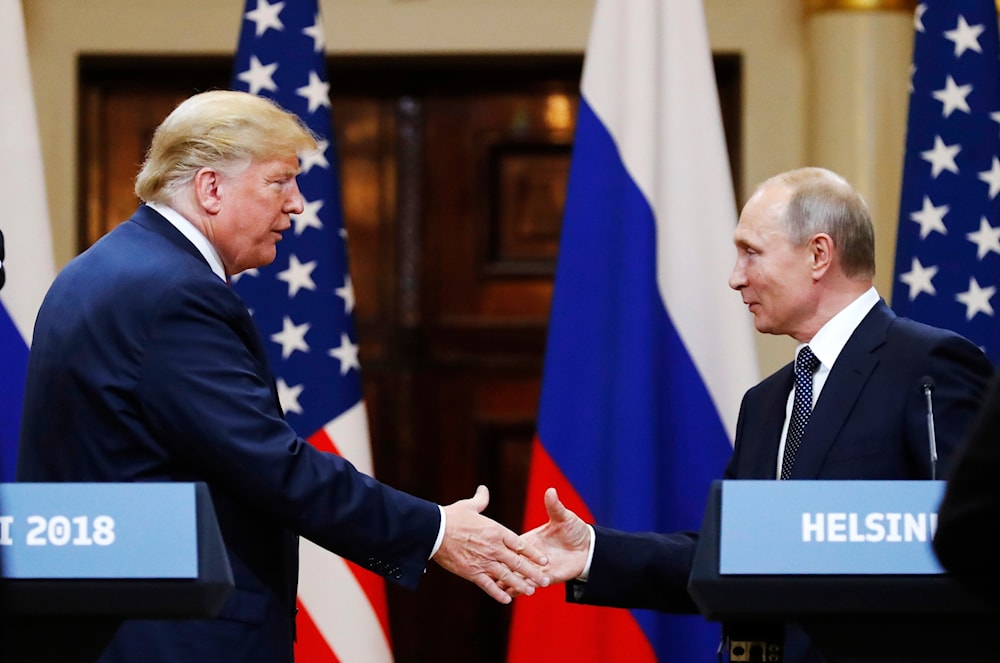Can the EU sanctions regime hold up without the US? : FT
The 16th sanctions package followed US Secretary of State Marco Rubio's statement that the EU will eventually have to lift its sanctions as part of a peace deal that'd end the war in Ukraine.
-

US President Donald Trump shakes hand with Russian President Vladimir Putin at the end of the press conference after their meeting at the Presidential Palace in Helsinki, Finland, July 16, 2018. (AP)
The European Union announced its 16th package of sanctions against Russia on Wednesday, in response to US Secretary of State Marco Rubio implying that lifting European Union sanctions could be part of a deal to end the Russo-Ukraine war.
The G7 group previously coordinated sanctions against Russia in 2022 at the start of the war between Russia and Ukraine, targeting Moscow's banks, oil and metal industries, and much of Russia's imports.
According to Henry Foy of Financial Times, Trump's "negotiations with Russia to bring a rapid end to the war against Ukraine could change that," pointing out that US Secretary of State Marco Rubio "agreed with the Russian FM Sergey Lavrov to 'lay the groundwork for future co-operation on . . . economic and investment opportunities'".
"Rubio later said the EU would have to 'be at the [negotiation] table at some point' only because of its sanctions, the implication was clear: lifting them was part of the deal," Foy points out.
The European Union's 16th sanctions package on Russia was a "concerted move to underline that the bloc would stick to its guns in supporting Ukraine and weakening Russia, regardless of what changes in the US' foreign policy," according to Foy.
EU officials have long admitted that being cut off from the US dollar was the most important tool in the G7's plethora of measures to enforce, Foy noted, adding that despite the US signaling to EU officials that sanctions will remain, this conflicts with the declared goal to "improve economic co-operation with Russia."
Foy concludes by saying that if the US were to lift its sanctions on Russia or "even signal it was no longer bothered" with enforcing those sanctions, Russia would find it much easier to regain access to global financial markets and resume normal trade and economic activities, weakening the intended impact of the restrictions.
Trump rushes to end Russo-Ukraine war
Russian and United States officials agreed during their meeting in Saudi Arabia on Tuesday to discuss moving toward ending the war in Ukraine and improving diplomatic and economic ties between the two countries.
US Secretary of State Marco Rubio told the Associated Press that the Riyadh meeting was the beginning of further discussions and dialogue, while Russian Foreign Minister Sergey Lavrov said, "We not only listened but also heard each other," describing the talks as "very useful."
The discussions' goal is to prepare a summit that will bring US President Trump and his Russian counterpart Putin, and the Russian FM Lavrov said that both sides agreed on three goals and will begin "regular consultations" on Ukraine.
The Kremlin noted on Thursday that the preparations for the meeting between Trump and Putin could take several weeks and even months, following a "lengthy and productive phone call" as described by Trump with the Russian president.
On February 17, Russian Ambassador to the UN Vassily Nebenzia said that the "hot phase" of the Ukrainian crisis could be ended soon, following the diplomatic efforts and shits in US policy following Trump's inauguration.

 3 Min Read
3 Min Read











